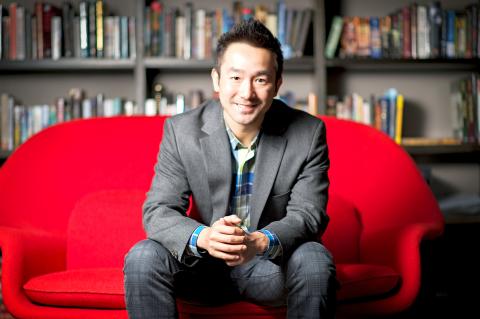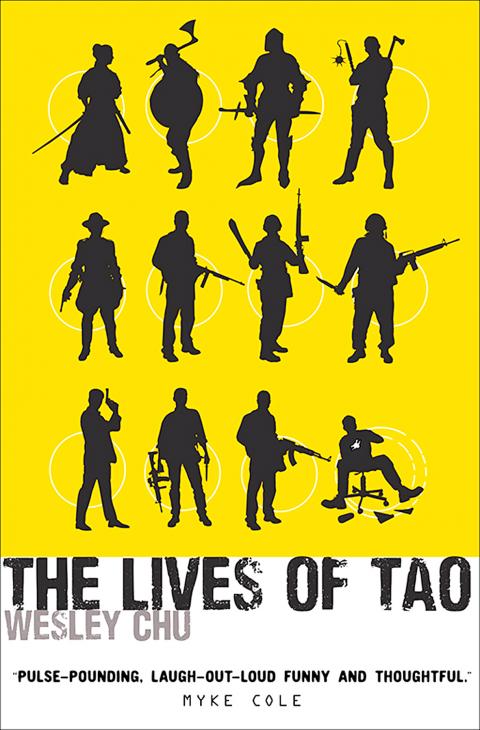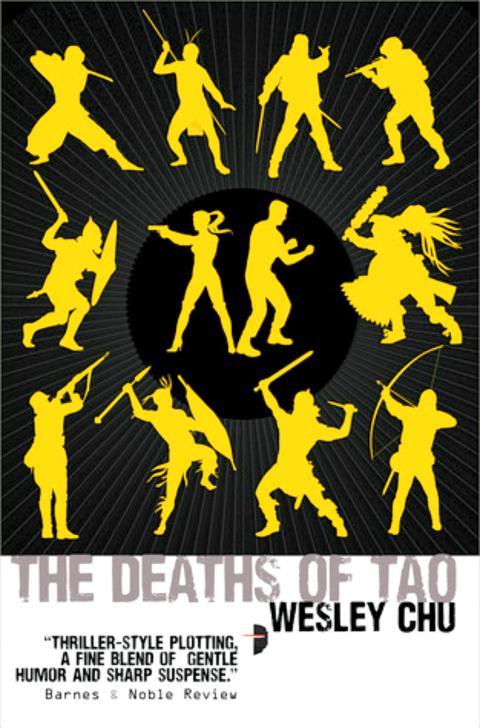It’s 11pm in Taipei but 10am in Chicago, where the award-winning author Wesley Chu (朱恆昱) is as usual in his “cave,” looking a little frayed around the edges. It’s not just the bathrobe, which has been ripped at the elbow by his dog. Handsome enough to have modeled and been cast in minor Hollywood movie roles, Chu has bed hair, a full beard and that dazed look of someone who has just woken up — or worked all night.
Framed by groaning bookshelves and sitting in his comfy chair, it would appear that the life of a science fiction writer is about letting go, being free to imagine time-bending scenarios and characters that crisscross the universe in search of derring-do. But it’s not quite that simple.
We have been emailing back and forth for weeks and after text messaging on Google Hangouts we agree to a “face-to-face” interview. If it was the 20th century, this would not be happening. In fact, it would be thought of as science fiction.

Photo courtesy of Wesley Chu
Born in mid-1970s Taipei, Chu was initially brought up in Chiayi by his grandparents because his father was studying in the US. He recalls the convenience store his grandfather owned, a chicken coop, an out-house and “biting the nose of the principal’s son because he took my toy.” At the tender age of five he joined his parents in Nebraska, but still considers himself Taiwanese, and Taiwanese-American.
Fast forward to the tail end of the 1990s and Chu had graduated from the University of Illinois with a degree in management information systems. He would go on to work as a consultant and software engineer before joining Bank of America and becoming an associate vice president.
Comfortable. Yes. Successful. Yes. But it wasn’t the life Chu wanted. In fact, he hated it. His original plan was to be a writer but his father dissuaded him, worried he would “suffer” financially as an artist. The filial son suspects that even now his father would prefer that he was working at JPMorgan rather than on fiction. Odd for an English professor to think this, you might say, but entirely in character for a “Tiger Dad.”

Photo courtesy of Wesley Chu
To get the ball rolling during our face-to-face, I point out the obvious and ask: “It really is true then that authors roll around in a bathrobe all day and essentially think great thoughts?”
“Yes, it’s fantastic. Going to work is a walk of 40 steps,” Chu says.
“Well, those 40 steps can be a challenge, I’m sure, but don’t you miss the cut and thrust of cubicle politics, the rustle of spreadsheets and the endless meetings?” I ask.

Photo courtesy of Wesley Chu
“Not one red second. It’s a different politics now, there’s publishing politics. If anything, it’s sometimes worse,” Chu says.
“You’re dealing with people who are very close to their work. In business and corporations, at least in business it’s just business. In publishing, especially for the writers, their books are like children,” he adds.
Chu is technically a SFF (science fiction and fantasy) author, and a “high concept” or “big idea” writer, meaning he comes up with plausible alternate realities, particularly those in which some kind of compelling innovation has taken place. His characters are strong and full of personality. They clash, strive and evolve according to how events play out in the novel.
His prose has a cinematic style, meaning while reading you can imagine how it would play in the movie theater. He is quite insistent that his writing style is natural rather than the result of having one eye on a big payday, saying, “It’s just the way my voice comes out.”
He’s also rather modest about his English skills, claiming his wife will divorce him if she has to do another editing job for him. Another plus is he has a globalized outlook, incorporating Asian concepts and geographical locations in his novels. His second book, The Deaths of Tao takes place in Taipei and Kaohsiung.
His literary coming out party was The Lives of Tao, which I read as having a Buddhist worldview, but Chu puts me straight on that one: “I didn’t have Asian spiritualism in mind when I was world-building the novel. I was actually more focused on writing a very personal story that reflected what I was going through at the time. The Lives of Tao, in essence, is a coming-of-age story.”
The protagonist works a dead-end job, has low self esteem and in the end finds purpose in life. While that may sound familiar, the alien that inhabits the protagonist and helps him become the person he wants to be, is of course, pure fiction. The Lives of Tao won an Alex Award and spawned a trilogy, which isn’t a bad start to a literary career.
“I’ve won a few awards,” he says. “Nothing really changes. You get a bump in sales for sure but other than that, you keep on writing. Even making the New York Times bestseller list doesn’t change your life.”
For me, his second book, Time Salvager, the first installment of another planned trilogy, is more cogent, muscular and confident. It’s set 400 years in the future and the hero is a jaundiced, addicted individual whose job is to go back in time, steal energy and not get caught. It’s strong enough to have been optioned by Paramount, with Michael Bay slated to direct.
Chu’s books have been translated into Russian, German, Hebrew and Hungarian, while Time Salvager will be published by Nautilus in Taiwan and People’s Literature in China. He says he would “love to work with Asian filmmakers on a film/television adaptation.”
Some people don’t think about the future and are not interested in books on this subject. But a grounded reality and history is also important to Chu, and it’s what makes his stories appealing.
“If you think about it, 400 years ago, we weren’t even in the steam age yet. It was horses, swords and wooden ships,” he says.
“If you bring someone from the 17th century to the present, they would probably swear we’re wielding magic. Technology advances at a curve. We’ve had more advancements in the past 50 years than in the past 500.”
As I might have intimated, Chu is really understated — from his bed hair down to the four bathrobes he wears out in a year. He claims to do nothing but write in his “cave” and occasionally get walked by his dog. He doesn’t mention his acting, modeling, nerd credentials, business and banking experience, the fact he’s a gymnast and martial artist, though he does note that “just this year, I went to Tanzania in Africa to summit Kilimanjaro.”
If the boy in Chiayi could see his future life with all the compelling innovations that have taken place, I guess it would look a bit like the science fiction/urban fantasy Chu writes.
1 OH 1, can refer to Taipei 101; an introductory course or analysis; One uh One, a spare male at a party, or a useless person — always male; there are about 1.01 men for every 1 woman, thus, every one hundred and first male is not going to find a partner-; a one-on-one interview

April 14 to April 20 In March 1947, Sising Katadrepan urged the government to drop the “high mountain people” (高山族) designation for Indigenous Taiwanese and refer to them as “Taiwan people” (台灣族). He considered the term derogatory, arguing that it made them sound like animals. The Taiwan Provincial Government agreed to stop using the term, stating that Indigenous Taiwanese suffered all sorts of discrimination and oppression under the Japanese and were forced to live in the mountains as outsiders to society. Now, under the new regime, they would be seen as equals, thus they should be henceforth

Last week, the the National Immigration Agency (NIA) told the legislature that more than 10,000 naturalized Taiwanese citizens from the People’s Republic of China (PRC) risked having their citizenship revoked if they failed to provide proof that they had renounced their Chinese household registration within the next three months. Renunciation is required under the Act Governing Relations Between the People of the Taiwan Area and the Mainland Area (臺灣地區與大陸地區人民關係條例), as amended in 2004, though it was only a legal requirement after 2000. Prior to that, it had been only an administrative requirement since the Nationality Act (國籍法) was established in

With over 80 works on display, this is Louise Bourgeois’ first solo show in Taiwan. Visitors are invited to traverse her world of love and hate, vengeance and acceptance, trauma and reconciliation. Dominating the entrance, the nine-foot-tall Crouching Spider (2003) greets visitors. The creature looms behind the glass facade, symbolic protector and gatekeeper to the intimate journey ahead. Bourgeois, best known for her giant spider sculptures, is one of the most influential artist of the twentieth century. Blending vulnerability and defiance through themes of sexuality, trauma and identity, her work reshaped the landscape of contemporary art with fearless honesty. “People are influenced by

The remains of this Japanese-era trail designed to protect the camphor industry make for a scenic day-hike, a fascinating overnight hike or a challenging multi-day adventure Maolin District (茂林) in Kaohsiung is well known for beautiful roadside scenery, waterfalls, the annual butterfly migration and indigenous culture. A lesser known but worthwhile destination here lies along the very top of the valley: the Liugui Security Path (六龜警備道). This relic of the Japanese era once isolated the Maolin valley from the outside world but now serves to draw tourists in. The path originally ran for about 50km, but not all of this trail is still easily walkable. The nicest section for a simple day hike is the heavily trafficked southern section above Maolin and Wanshan (萬山) villages. Remains of